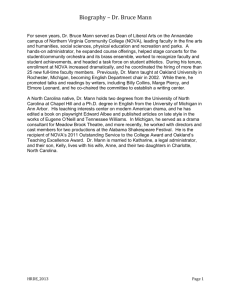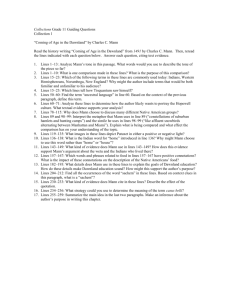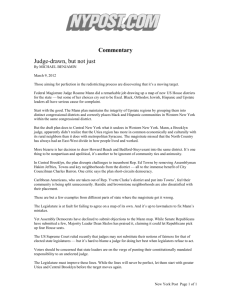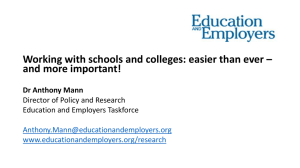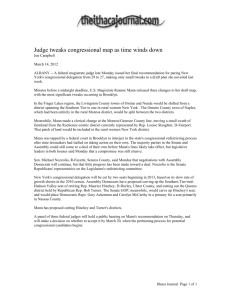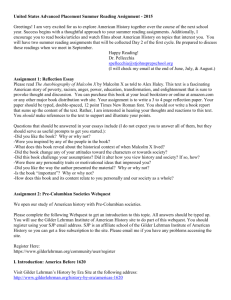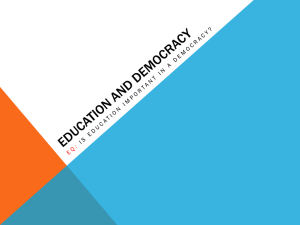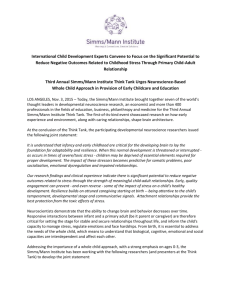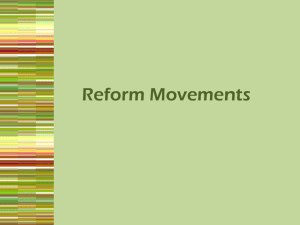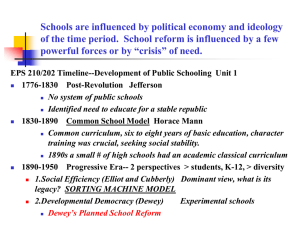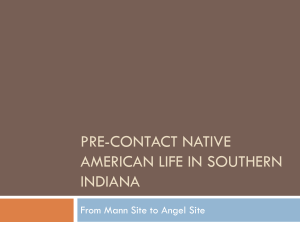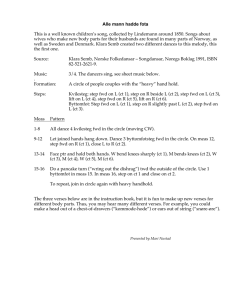A report from the front lines: The Michael Mann v. National Review
advertisement
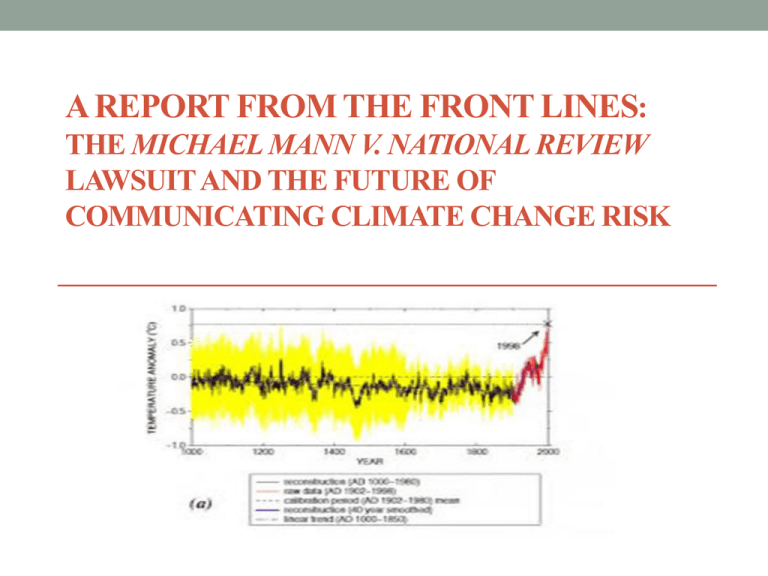
A REPORT FROM THE FRONT LINES: THE MICHAEL MANN V. NATIONAL REVIEW LAWSUIT AND THE FUTURE OF COMMUNICATING CLIMATE CHANGE RISK The Climate Change debate A Quick Review 1990’s the world became convinced climate change posed a great risk, culminating in the Kyoto Protocol (1997) U.S. signs but does not ratify Kyoto because: (1) developing countries excluded from GHG reduction mandates; and (2) could harm U.S. competitiveness and economy. Byrd Hagel Resolution passes Senate 95-0 opposing Kyoto signing. 1998-99 Geophysicist Michael Mann publishes what has become the face of climate change: the “hockey stick” graphs. 1998 was also the hottest year on record…. The Hockey Stick Graphs Skepticism or Denial? • “Debate” surrounding climate change soon transformed from a purely economic concern to an attack on the underlying science propelled by the internet. • The “skeptics” (or “deniers”) effectively use the internet, advocacy groups to dispute validity of climate science. • Use methods fair and foul: stolen e-mails, unfounded conspiracy theories, lawsuits and investigations, surrogate “scientists,” and most importantly, the inherent complexity of climate science. The making of a lawsuit Attacks on climate scientists get personal: 2009 University of East Anglia e-mail theft provide fodder Virginia Attorney General attempts to subpoena Prof. Mann’s e-mails and records pursuant to the Virginia Fraud Against Taxpayers Act (court rejects) to determine “whether or not fraud has been committed.” See, Cuccinelli v. University of Virginia, 722 S.E. 2d. 626 (2012). Mann accused of “data manipulation,” being “corrupt” and guilty of “academic and scientific misconduct” by a Competitive Enterprise Institute critic. Openmarket.org (July 13, 2012) “Michael Mann was the man behind the fraudulent climate change hockey stick graph.” National Review Online (July 15, 2012) The scientist strikes back • Prof. Mann demands a retraction and apology from the Competitive Enterprise Institute and National Review or he will take legal action against them. In response, they welcomed the suit (want to see Mann’s e-mails). • October 2012 Mann files suit against the authors, the National Review Online and the Competitive Enterprise Institute alleging libel and intentional infliction of emotional distress claims. • Mann v. National Review, Inc., et al. Superior Court of the District of Columbia, Case No. 0008263-12 Libel in U.S. Courts • Claims of libel concerning press reports on public figures require plaintiff to prove actual malice. N.Y. Times v. Sullivan, 376 U.S. 254 (1964) • ‘Actual malice’ is knowledge of falsity or reckless disregard for the truth. • Washington D.C. has an “anti-SLAPP” law protecting free speech and public participation on issues of public concern. Anti-SLAPP protection • At the beginning of the lawsuit, plaintiff must establish that his claim is “likely to succeed on the merits” (D.C. Code 16-5502) by showing: 1. Statement is defamatory 2. Factual assertion, not matter of opinion 3. False statement 4. Made with ‘actual malice’ • Defendants move to dismiss, claiming statements were opinion or “rhetorical hyperbole” or “exaggerations.” Trial Court Opinion • Two trial court judges found Prof. Mann met this burden and was “likely to succeed on the merits.” (Ruling is now on interlocutory appeal and discovery stayed). • “Defendants consistently claim that Plaintiff’s work is inaccurate (despite being proven as accurate) then there is a strong probability that (Defendants) disregarded the falsity of their statements and did so with reckless disregard.” (emphasis added) • Opinions are actionable if based on or imply false fact(s). Milkovich v. Lorain Journal Co., 497 U.S. 1 (1990) Importance of Prof. Mann’s suit • Is climate science on trial? Or is climate “skepticism”? BOTH: • Prof. Mann must prove his “hockey stick” graph is sound (as found by 10 separate investigations and at least a dozen similar studies), i.e. no evidence of wrong-doing • Defendants must show the factual basis for their claims: they did not recklessly disregard the truth…. • Most important: Discovery. Defendants will have to release their e-mails discussing climate change – What will those e-mails contain? Proponents vs. The “Skeptics”? • Progressive free speech organizations (including the American Civil Liberties Union or ACLU) are supporting defendants in their appeal. • Environmental Law Professors Jonathan Adler and Dan Farber have asserted that defendants’ comments are protected by the First Amendment • What could be the result if Prof. Mann is vindicated in this suit? Be careful what you wish for… Prof. Mann apologizes for a tweet where he accused journalist Andrew Bolt of being paid by Rupert Murdoch to “lie” about climate change, removes from his twitter feed. Others: “(G)lobal warming deniers are now on par with Holocaust deniers…” “(W)e should have war crimes trials for these bastards – some sort of climate Nuremberg.” “(T)he current wave of climate change skepticism smacks of 1930’s appeasement.” If this is a war, we are losing • 2011 AngusReid Public Opinion Poll: 42% of Americans and 48% of Great Britain respondents believe either global warming is an unproven theory or it is due to natural causes. • 2013 Pew Research Poll: Bare majority (54%) in world survey believe climate change is a threat to their country (Only Latin America consistently ranks climate change as most important threat to their country) • 2014 Gallup Poll: only 36% of Americans believe global warming poses a serious threat in the near future How can we turn the tide? “Do not swallow bait offered by the enemy” “The rule is, not to besiege walled cities if it can possibly be avoided.” Sun Tsu, The Art of War “Skeptics” hide behind the formidable walls of climate science opacity Select the terrain of battle Climate science is opaque, RISK IS NOT • Employed by insurers, banks, militaries and governments, i.e. non-environmental organizations • Concept simple, readily understood: magnitude x likelihood = risk • Forces “skeptics” into untenable position: certainty that the risk is zero or close to it (professional risk assessors are wildly inaccurate) Sun Tsu says it best You can be sure of succeeding in your attacks if you only attack places which are undefended … You can ensure the safety of your defense if you only hold positions that cannot be attacked.
